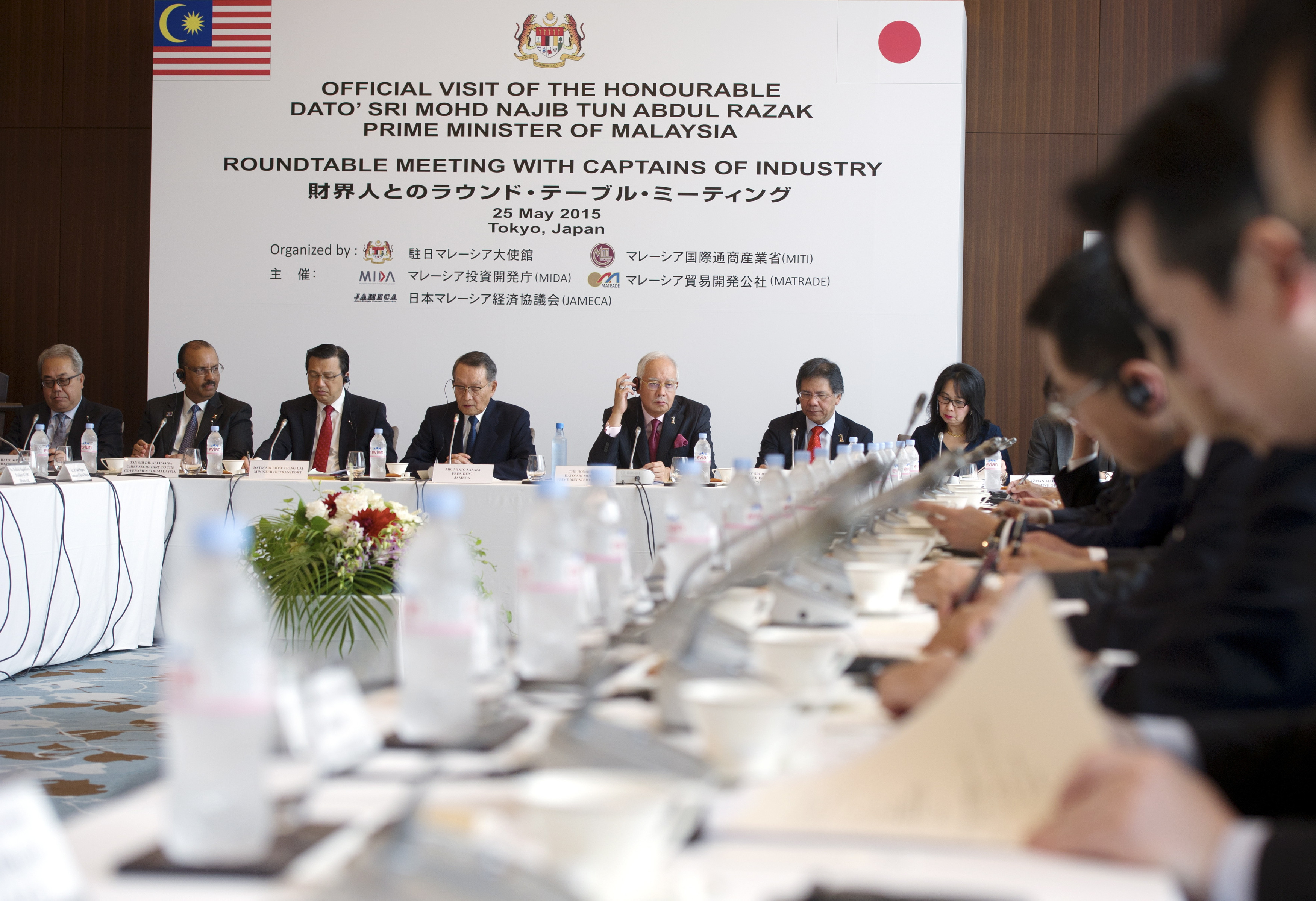ID :
368616
Mon, 05/25/2015 - 09:57
Auther :
Shortlink :
https://oananews.org//node/368616
The shortlink copeid
Japanese Firms Showing Interest In Islamic Finance, Halal Industry, Says M'sian PM

From Arul Rajoo Durar Raj
TOKYO, May 25 (Bernama) -- Japanese businesses, for decades among the biggest investors in Malaysia, are expressing growing interest in Islamic finance and the halal industry, said Malaysian Prime Minister Najib Razak (three right).
He said Malaysia is currently the world’s largest sukuk market and also the first country in the world to introduce Halal Parks or dedicated halal industrial estates.
Since 2010, these have attracted US$2.36 billion (RM8.8 billion) in investments from United States, Italy, Taiwan and Singapore, said Najib.
"I am pleased to say that more and more businesses in Japan now seem to be aware of the great opportunities available in Malaysia," he said in his address at a roundtable meeting with 34 captains of industries here.
He said Malaysia is also increasingly seeing companies from Japan undertaking projects related to advertising and engineering, while active in financial services, with Bank of Tokyo-Mitsubishi UFJ, Mizuho Corporate Bank and Sumitomo Mitsui Banking Corp, among the major players.
Also present at the roundtable meeting was Transport Minister Liow Tiong Lai, Mikio Sasaki, President of the Japan-Malaysia Economic Association (JAMECA), Malaysian Ambassador to Japan Ahmad Izlan Idris, president and chief executive officers of some of the top Japanese firms.
Najib, who is currently on a three-day official visit, said 2014 was a record-breaking year for Malaysia as far as investments are concerned.
The country attracted a total of US$68 billion (RM244.28 billion) in investments, both foreign and domestic, while total trade expanded by two per cent to US$445 billion (RM1.598 trillion) in 2014.
The Prime Minister said exports also increased by 2.5 per cent to US$235 billion (RM844.21 billion), while imports rose by 1.4 per cent to US$210 billion (RM754 billion).
Najib said Malaysia’s well-diversified economy, low inflation, healthy labour market conditions and sound banking system provided a conducive environment for businesses to flourish.
Hence, he said, now is the right time for Japan to work even more closely with Malaysia, and indeed, ASEAN, as the country's growth was strong, at six per cent.
"Though, both the International Monetary Fund and the World Bank, had revised downward their global economic growth estimates for 2015 to 3.5 per cent and 3.0 per cent respectively, we still recorded a healthy 5.6 per cent for the first quarter," he added.
Malaysia’s fundamentals have been strengthened through the government’s Economic Transformation Programme, and a series of bold reforms.
These include liberalising the economy, the removal of subsidies and broadening the tax base, which has been reflected in global rankings for competitiveness and business friendliness.
Najib also said that the second wave of Malaysia's Look East Policy (LEP) would give sharper focus to economic cooperation between both countries, with special emphasis to developing strategic sectors such as high-tech and high-end service industries.
"Details are currently being worked out by officials from both sides. But I am certain that this new initiative will create plenty of mutually beneficial opportunities and partnerships," he added.
The LEP was introduced by Malaysia in 1982, and during Najib's meeting with his Japanese counterpart Shinzo Abe in July last year, both countries agreed to strengthen further bilateral ties through a second wave.
More than 15,000 Malaysians have benefited from the LEP, and currently about 2,250 students are studying in mostly engineering, science and technology based courses throughout Japan. (photoBERNAMA)
-- BERNAMA





